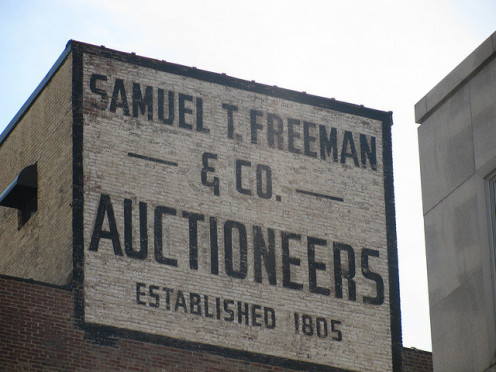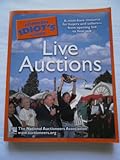Auction Etiquette and Bidding Tips

Have you ever attended a live auction?
Auctions Are Entertaining To Say The Least
Live auctions can be a lot of fun, especially if you like the thrill of finding a great bargain. It’s an opportunity to meet new people, learn about items you may have never seen before and have a chance to purchase something you really want. Depending on interest in the item, you could possibly buy it for a really great price.


Basic Types of Live Auctions
There are four basic types of auctions.
- English Auction – this most common type of auction is typically used to sell items such as antiques, artwork and other household goods. The bidding begins at a reserve price, if there is one, and ascends up from there, usually in predetermined increments if there is interest from a bidder. The auction continues until there are no other bid increases. This type of auction is known as a first-price auction because the winner pays his bid.
- Dutch Auction – is known as a descending first-price auction. It begins at a higher price than the item is believed to bring in. The price is decreased by an auctioneer until a bidder claims “mine” and that is the price he will pay. If there are multiple items offered in the auction, the same process continues until all the items have been sold. This method of auction is faster than an English auction and preferred in some markets.
- First-Price, Sealed-Bid Auction – is a bidding strategy where bidders submit a single bid placed in a sealed envelope. Once the bidding is closed, the envelopes are opened. The highest bidder is announced and receives the item for his bid price.
- Second-Price, Sealed-Bid Auction – is also known as the Vickrey Auction. It works the same as the first-price, sealed-bid auction above. The only difference is the winning bidder does not pay his bid. He pays the second highest bid instead. This auction type is rarely used.
Auctions are typically held as:
- Public Auctions
- Estate Auctions
- Police Auctions
- Government Auctions
- Seized Property Auctions
- Charity Auctions
- Fund Raising Auctions

When to Attend an Auction
Many people attend auctions on the weekend when there is more chance for bidding wars to occur. Attending an auction mid-week usually has a much smaller attendance allowing you a chance to get the items you are interested in for a decent price.

When to Begin Bidding
It is not always the best strategy to be the first to place a bid. If you start your bid later in the game, other bidders may be inclined to pull out because they feel the price will go out of their range. Be patient.

How to Make an Auction Bid
If you want to make a bid at an auction, you cannot be shy. You must be prepared to be in the spotlight, at least momentarily. There are several different ways in which people bid at a live auction. The two most common are either raising your hand or your bidder’s paddle.
If it seems as though you are unable to get the attention of the auctioneer, you may need to wave your hand or paddle “bigger” or even shout “yes” or “here” to place your bid. After your first bid is taken, the auctioneer should continue looking your way. Just a nod of your head or a hand gesture accepting a higher bid will usually suffice.

Making a Movement That You Did Not Mean as a Bid
It is common to fear making some sort of motion, like scratching your head, being construed as a bid from you. Although it has happened, it is rare and you will not be held responsible.
Keep in mind that most auctioneers also fear accidentally accepting a bid that was not meant to be. They are usually very careful and may even stop for a moment to ask if they are uncertain.

How High Should You Bid
Always have a top bid that you are willing to pay before an auction begins. If the bidding reaches your limit, stop. To be sure the auctioneer knows you have stopped, you can shake your head “no” or even turn away.
Many people get caught up in the frenzy of an auction. It can be very easy to bid beyond what you are willing to pay and/or what you can actually afford. It is important that you remain in control so this does not happen.

Once You Hear the Word “Sold”
You can stop bidding anytime during the process. But when you hear the word “sold,” if you won the bid, it is yours and you are obligated to pay for the item.


What if You Cannot Attend the Auction
If you’ve had the opportunity to preview auction items ahead of time and you are unable to attend, there are many auction companies that accept proxy bids. They will place a bid on your behalf not going past the bid maximum that you specify. This verbal agreement is considered a legal contract and you are responsible for payment if you win.

Join Auction Mailing Lists
Sign up for auction mailing lists to receive advance notice of where, when and what will be auctioned.
Plan to Have Fun!
Auctions can be fun and sometimes profitable too. But even if you do not buy a thing, you are guaranteed to be entertained. Enjoy!
This is Sharyn's Slant











